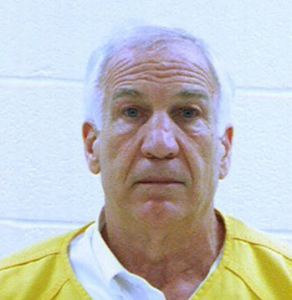
BELLEFONTE – A judge has heard arguments from Jerry Sandusky’s attorneys about the fairness of Sandusky’s trial but has not issued a ruling.
The former Penn State assistant football coach wants Judge John Cleland to grant him a new trial. The hearing revolved around the appeal of Sandusky’s conviction, with the primary argument being that his defense did not have time to prepare for trial.
Joseph Amendola — who was Sandusky’s lead counsel during the trial — took the stand. Amendola testified to the reams of files and discovery he received, which was more than 12,000 pages worth between his investigative efforts and information turned over by the Commonwealth.
However, upon cross-examination, Amendola admitted that just one box of documents was all that was necessary for him to cross-examine Sandusky’s victims. He further said that no documents reviewed since the conviction — which may have gone un-reviewed before trial — would have helped the defense at all.
Described outside court “as a last desperate move” by lead prosecutor Joseph McGettigan, Cleland is expected to rule on the appeal within the next 30 days.
Cleland opened court at 9:42 a.m. to about 30 members of the press, Dottie Sandusky, their son Jeff, about 10 Sandusky supporters and only a few members of the public. Of note was the presence of Debra McCord, Matt Sandusky’s mother, who sat in the back of the courtroom fixated on Sandusky while he was in the courtroom.
NBC reported that Sandusky came bounding into court with a large smile, moving quickly towards his family and friends, exclaiming, “Hi there!” The sheriffs had to direct Sandusky to stop and to sit at the defense table. The noticeably thinner and now nearly entirely white-haired Sandusky waved frequently towards Dottie, while wearing a darker red Centre County prison jumpsuit that was short-sleeved.
Sandusky was not called to the stand, but did appear to actively participate, being quick to pass exhibits to Norris Gelman, a Philadelphia lawyer now taking the lead in the appeals process.
Amendola’s testimony opened the hearing, which lasted just short of two hours. He described the process in which he filed 50 motions, noting that “starting with Jan. 28, 1,114 pages of discovery material” were received. More than 9,000 pages of documents were presented to Amendola and his team as the result of the mandatory discovery turned over by the Commonwealth, and subsequent materials request by Amendola.
In addition, the Sandusky investigators generated another 3,000 pages of material. Noting that “we had to copy out of one machine in our office,” Amendola said, “We didn’t have the time to review much of that material” when asked about it by Gelman.
The cross examination by McGettigan was forceful at times, and as Amendola and McGettigan sparred early over points of what was provided to his defense, Cleland interjected strongly saying that this is “not time for debate, you are a witness” towards Amendola.
Later, McGettigan asked and suggested that Amendola “worked hard on this case.” Amendola replied, “I worked very hard.” One new piece of information that came out in the cross examination, was that Amendola had requested cell phone records from various carriers and message records from Facebook, as he tried to build his defense that the victims coordinated their testimony and allegations. He said that is information that would have taken 3-6 months and wouldn’t have been available for trial.
One of McGettigan’s final questions was to ask Amendola, “[Would you] agree that most material was irrelevant?” meaning material he requested and subpoenaed. Amendola responded, “It turned out to be, adding, “Some material we found to be [relevant], but was inadmissible.”
Arguments were next presented with Cleland questioning on legal matters. Gilman essentially admitted that there no prejudicial information learned post-trial from items that couldn’t be reviewed prior to the trial. Gilman also argued that some of the judge’s juror instructions could’ve been prejudicial, specifically to the fact that it should not matter when victims brought forward their charges — a charge from Cleland.
The Bob Costas interview on “Rock Center” came up again, and this time, the lead prosecutor’s comments in his closing arguments that the defense said made it sound like Sandusky could speak to Costas, but wouldn’t testify in front of the jurors. Cleland seemed to be unmoved by both arguments, especially after Frank Fina, a prosecutor, recited the entire trial transcript of the argument in question.
As court was recessed, Sandusky said to his wife that, “They’re [defense are] gonna ask if you can see me.” He was then escorted from the courtroom. It was not known if the visit occurred, but Sheriff Denny Nau indicated that it was “time to go,” to Sandusky as they were leaving.
Outside court, Gelman described Sandusky’s state and his prison life saying “he’s in great spirits,” and that Sandusky has a television in prison, two phone calls per month, and one personal visit. Regarding his chances on appeal, Gilman said, “We’re in the race, I wouldn’t count us out.”
Gilman later described their chances as a 3-point shot in basketball. When asked by WCAU’s LuAnn Cahn about that analogy, McGettigan said that stout Gilman “didn’t look like a good basketball player.”
Stay with 6 News, WJACTV.com and WJACTV.com Mobile for continuing coverage.


